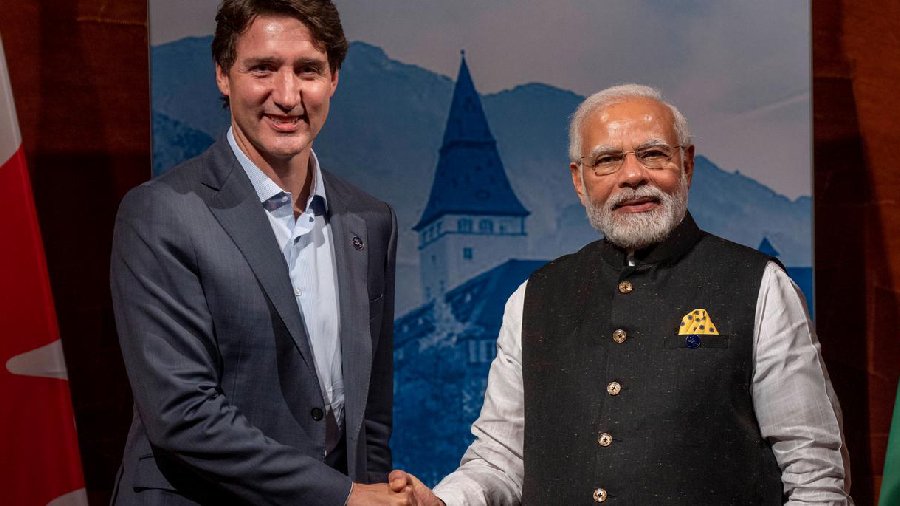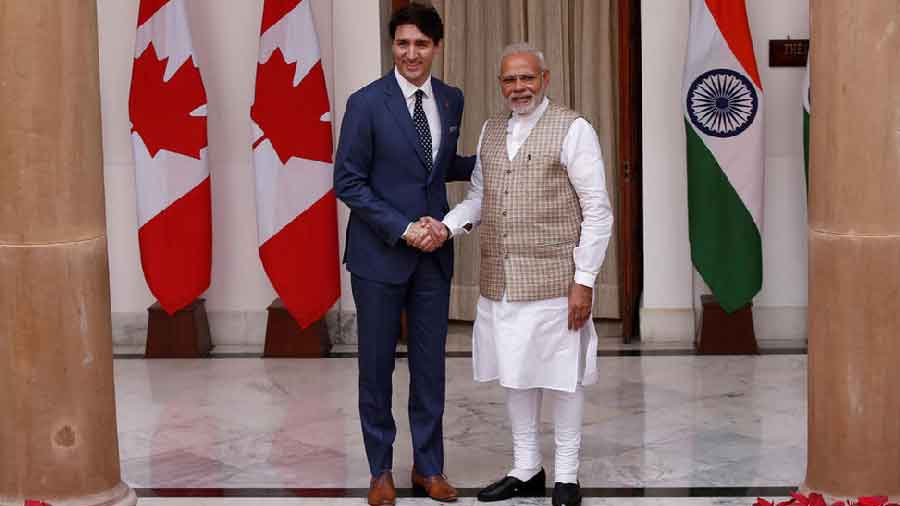A Sikh separatist group organized a so-called referendum in the Canadian city of Brampton on Sunday, asking the Sikh diaspora in the North American country to vote on whether areas of India where the Sikh religion is in the majority should be an independent country known as "Khalistan."
While the Sikhs for Justice (SFJ), which has been outlawed in India as a terrorist organization, claims thousands of people took part in the vote, it was not clear how many exactly participated and when the results would be out.
Videos on social media showed lines of men and women with yellow "Khalistan" flags turning up at a polling station, but their authenticity cannot be independently verified by DW.
"There were people who came in cars and buses from outside Brampton. There was an arrangement for food and shelter for visiting people from around Canada. Entry to the venue was only possible for those who back the movement," said Himanshu Bharadwaj, a Brampton resident.
Warning to the Canadian government
India has strongly condemned the vote and the Canadian government for allowing it to take place.
Last week, New Delhi issued a strongly worded statement calling on Prime Minister Justin Trudeau's administration to ban the groups behind the vote.
"We find it deeply objectionable that politically motivated exercises by extremist elements are allowed to take place in a friendly country," Arindam Bagchi, spokesperson for India's Foreign Ministry, said last week.
"Our position on the efforts by anti-India elements to hold a so-called Khalistan referendum is well-known and has been conveyed to the Canadian Government, both in New Delhi and in Canada," Bagchi said.
While the Canadian government has said that it respects India's sovereignty and territorial integrity, it had refused to stop the vote.
"Canada has a longstanding position on this issue. There is no crime to prosecute here. Both the conservative and liberal party leaders are wary of it becoming a violation of the freedom of expression issue," Terry Milewski, a retired CBC journalist and author of "Blood for Blood — Fifty Years of the Global Khalistan Project," told DW.
Sikh political voice growing in Canada
Khalistan is the name of the state some secessionist groups propose to set up by carving out areas of India where the Sikh religion is in the majority.
The violent separatist movement began in the 1980s.
Some Sikh separatist outfits have been increasing their presence and influence in places like Canada, the UK and the United States, which have sizable Sikh diaspora.
Sikhs currently account for around 1.4% of Canada's population, or about 500,000 people. They are becoming a key political constituency, with several Sikh lawmakers now serving in both the federal parliament as well as in local councils.
"Canadian leaders do not want to lose Sikh votes but they wrongly think the loud minority of Khalistanis are all Sikhs of Canada," Milewski said.
"Even if say 100,000 Sikhs turned up to vote, which is an exaggeration, that means about 80% of all Sikhs do not care for this cause. It looks like a PR campaign, a money-making enterprise that brings good business for the party involved," he added.
Ahead of the vote over the weekend, India had even reminded Ottawa of the 1985 bombing of Air India Flight 182 off the coast of Ireland that killed all 329 passengers and crew, including 268 Canadian citizens. Canada-based Sikh militants were responsible for the attack.
It had been the world's deadliest act of air terrorism, prior to the 9/11 attacks in the US.
New Delhi also issued a rare travel advisory against Canada citing rising anti-India incidents after the first round of the vote, which took place in September.
The issue of Sikh separatist groups operating in Canada has become a growing source of tensions between New Delhi and Ottawa.
"This is a low-intensity issue for Canada as of now but definitely an irritant between the two countries. A vote taking place on Canadian soil for a state in India is plain absurd," Milewski stressed.
Fears of Hindu-Sikh tension in Canada
The Indian government, meanwhile, has been cracking down on anyone suspected of having ties to the Khalistan movement.
"Unlawful Activities (Prevention) Act (UAPA), a stringent law, has been used against some Sikh youth for 'waging war against the state.' These men, all under the age of 30, have been sent to jail for say putting up posters of Khalistan referendums or for possessing material related to the secessionist movement," said R.S. Bains, a human rights lawyer defending such cases.
"The organizers sitting in foreign countries do not understand the serious damage to the lives of these men and to their families. They use brainwashed youth who are often paid money for these activities. Sadly they languish in jails for years," he told DW.
These so-called referendums have also caused a divide between Sikhs and Hindus in Canada.
"The Hindu community might get incensed and my fear is that while we live peacefully with Sikhs here, I feel the situation can get tense with these referendums and can spiral into conflict," said Bharadwaj, who migrated from India and is currently working in Brampton as an accounting professional.
"People around me are concerned about the growing distrust between our communities fueled by this politics."
Some fear the growing tensions could lead to violence and rioting similar to the recent violence between Hindus and Muslims that shocked the UK city of Leicester, which is home to a large community of South Asian origin.
"Diaspora brings identities from their old homes to new ones. State narratives affect them. They often bring overseas the polarized politics of home," said Ajay Bisaria, a former Indian envoy to Canada.
"Connections with homeland have also got stronger with mobility, technology and social media. You don't have the benefit of borders in Brampton or Leicester to prevent conflict. And we see that diasporas are weaponized by state agencies of Pakistan to raise protest banners on Kashmir or Khalistani flags or other anti-India issues," he added.












